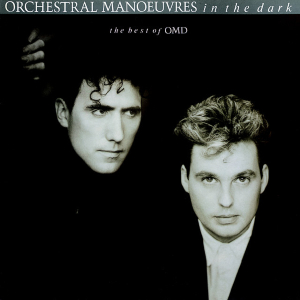The Best of OMD
| The Best of OMD | ||||
|---|---|---|---|---|
 |
||||
| Compilation album by Orchestral Manoeuvres in the Dark | ||||
| Released | 12 March 1988 | |||
| Recorded | 1979–1988 | |||
| Genre | Synthpop | |||
| Label | Virgin | |||
| Producer | OMD Mike Howlett Richard Manwaring Rhett Davies Brian Tench Stephen Hague Tom Lord Alge |
|||
| Orchestral Manoeuvres in the Dark chronology | ||||
|
||||
| Professional ratings | |
|---|---|
| Review scores | |
| Source | Rating |
| AllMusic | |
| Robert Christgau | B+ |
The Best of OMD is a compilation album by Orchestral Manoeuvres in the Dark, released in 1988.
The record essentially delineates the group's experimental early years from their pop-oriented later work: side one features recordings from 1979–1984, while side two is drawn from the group's 1984–1988 efforts. It was a worldwide success, becoming a Top 5 hit across Europe and achieving 3x platinum sales in the United Kingdom. "Dreaming" was released as a single and made little impact on the UK charts, reaching no. 50, but it was a hit in the US (no. 16), Germany (no. 26) and South Africa (no. 2).
The version of "Electricity" used is the same as the one featured on their debut album (which itself is the band reworking Martin Hannett's original Factory version). The band was originally going to use their very first version of this song, but found the drumming to be inferior and so settled for the remix of the track instead. "Messages" is the more popular 10" single version. "Tesla Girls" and "Talking Loud and Clear" are both 7" edited versions.
The worldwide CD, MiniDisc and DCC versions of the album are resequenced and feature four extra tracks not present on the LP version: "Telegraph" (a unique mix found only on this release, differing from the album version and both 12" versions), "Genetic Engineering", and 12" versions of "La Femme Accident" and "We Love You". The US CD adds only the latter two 12" versions. The Australian version of the vinyl album replaces "Secret" with "We Love You", since that song had been a popular hit there. There was also a video compilation released with the promo videos of some of the songs featured on the album.
It was the group's final album release of the decade, effectively closing a chapter on their history, and just before founding members Andy McCluskey and Paul Humphreys split in 1989, leaving the group name to McCluskey. According to Andy McCluskey, OMD released the album in order to pay off debts owned to Virgin Records.
...
Wikipedia
